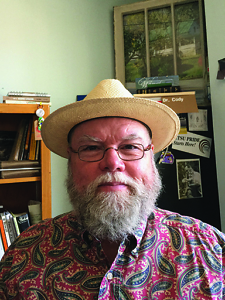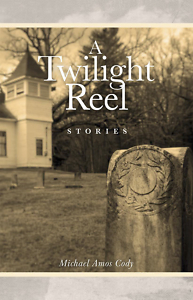Stranded in Time
The past and present collide in Michael Amos Cody’s story collection
“The past is never dead. It’s not even past,” said William Faulkner. It’s a sentiment that fairly shouts from the pages of Michael Amos Cody’s A Twilight Reel, a collection of haunting stories — quiet, meditative tales that build to a climax without giving up all of their secrets, leaving the reader to fill in the blanks. Cody’s stories are peopled with complicated characters: lost, angry, grieving, lonely, violent, and filled with regret, each one searching for some kind of peace. They linger in the mind’s eye long after the telling ends.
 The setting is the mostly fictional town of Runion, North Carolina, and the 12 linked stories follow the calendar year 1999. (Cody’s Runion shares its name with an abandoned logging town in his home county of Madison in North Carolina.) Many characters appear repeatedly, weaving a tapestry of shared relationships and family history, as they face the new millennium while often refusing to acknowledge the missteps of the past. In the most ambitious and complex story, “Decoration Day,” Cody sets a tale of adultery, torture, murder, massacre, and revenge against the backdrop of a gathering in a local cemetery to decorate the graves and celebrate the lives of heroic forebears. Meanwhile, events depicted at a nearby Civil War reenactment are contrasted with flashbacks revealing the atrocities actually committed by some of those same honored ancestors. It’s a fascinating perspective on history — the way our understanding of the past twists and turns, thanks to the lies told and the reasons why.
The setting is the mostly fictional town of Runion, North Carolina, and the 12 linked stories follow the calendar year 1999. (Cody’s Runion shares its name with an abandoned logging town in his home county of Madison in North Carolina.) Many characters appear repeatedly, weaving a tapestry of shared relationships and family history, as they face the new millennium while often refusing to acknowledge the missteps of the past. In the most ambitious and complex story, “Decoration Day,” Cody sets a tale of adultery, torture, murder, massacre, and revenge against the backdrop of a gathering in a local cemetery to decorate the graves and celebrate the lives of heroic forebears. Meanwhile, events depicted at a nearby Civil War reenactment are contrasted with flashbacks revealing the atrocities actually committed by some of those same honored ancestors. It’s a fascinating perspective on history — the way our understanding of the past twists and turns, thanks to the lies told and the reasons why.
Other tensions at play in this small Appalachian college town include racism, homophobia, classism, religious bigotry, and xenophobia. In “The Flutist,” a prospective candidate for a position in the music department asks the assembled faculty members what they don’t like about Runion. “This is Appalachia, Jubal,” one of the professors answers. “It’s a place kind of stranded in time, I think, between a very old and scary world and a very new and scary world. … It’s mean as in bad attitude and dangerous, and it’s mean as in poor and deprived. Deprived and depraved…”
 That depravity shows in the touching “A Fiddle and a Twilight Reel,” when a hate crime is committed against Mike, a 39-year-old gay musician who has returned to his childhood home to die of AIDS. Mike’s father has struggled to understand his son, and as he wearily disposes of the charred cross and the straw-filled effigy hung from a tree, carefully removing any evidence of their existence, Mike picks up his fiddle and plays. From inside the house, his mother understands that the music is a gift to the father. “What he played, she’d slowly realized, fit so well with the breaking and raking and erasing. … ‘He’s playing to you, Gene,’ she whispered at the window above the sink. ‘Just listen.’”
That depravity shows in the touching “A Fiddle and a Twilight Reel,” when a hate crime is committed against Mike, a 39-year-old gay musician who has returned to his childhood home to die of AIDS. Mike’s father has struggled to understand his son, and as he wearily disposes of the charred cross and the straw-filled effigy hung from a tree, carefully removing any evidence of their existence, Mike picks up his fiddle and plays. From inside the house, his mother understands that the music is a gift to the father. “What he played, she’d slowly realized, fit so well with the breaking and raking and erasing. … ‘He’s playing to you, Gene,’ she whispered at the window above the sink. ‘Just listen.’”
Cody, an English professor at East Tennessee State University, has a flair for fresh, descriptive prose. In the mind of a woman facing a lonely Valentine’s Day, “the loves of men and women became a tangled knot without one end visible to begin the unraveling.” A man facing the end of his marriage also confronts the cold of a record-breaking snowstorm: “numbness oozed from his mind and fell to fill his shoes and gloves, his shins and forearms.” Upon suddenly hearing the voice of her dead father while seated near his grave, a woman’s feet “sprang up like startled cats and plopped down again with little puffs of dust.”
So many voices speak from beyond the grave in A Twilight Reel, it’s as if the double-edged sword of history were itself a character. In the final story, the wife of a Y2K extremist contemplates whether to abandon her home and her husband of 36 years: “She felt the past, felt the weight of it, sometimes warm and dense like she imagined the downward pull of summer fruit felt to green branches, sometimes cold and ponderous like encasing ice or wet snow on naked limbs.”
Michael Amos Cody has conjured up a small town poised on the brink of a new day, dragging the chains of buried secrets and sorrows firmly behind it.

Tina Chambers has worked as a technical editor at an engineering firm and as an editorial assistant at Peachtree Publishers, where she worked on books by Erskine Caldwell, Will Campbell, and Ferrol Sams, to name a few. She lives in Chattanooga.


